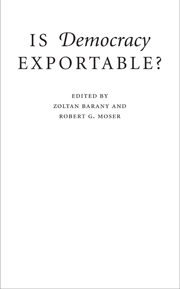Book contents
- Frontmatter
- Contents
- Contributors
- Acknowledgments
- Introduction
- A MORAL IMPERATIVE?
- STRUCTURAL PRECONDITIONS
- 2 Re-Integrating the Study of Civil Society and the State
- 3 Encountering Culture
- 4 Does Democracy Work in Deeply Divided Societies?
- 5 Democracy, Civil Society, and the Problem of Tolerance
- INSTITUTIONS AND PROCESSES
- Conclusion: Is Democracy Exportable?
- Bibliography
- Index
3 - Encountering Culture
Published online by Cambridge University Press: 05 June 2012
- Frontmatter
- Contents
- Contributors
- Acknowledgments
- Introduction
- A MORAL IMPERATIVE?
- STRUCTURAL PRECONDITIONS
- 2 Re-Integrating the Study of Civil Society and the State
- 3 Encountering Culture
- 4 Does Democracy Work in Deeply Divided Societies?
- 5 Democracy, Civil Society, and the Problem of Tolerance
- INSTITUTIONS AND PROCESSES
- Conclusion: Is Democracy Exportable?
- Bibliography
- Index
Summary
When assessing how a country's culture affects the potential for democracy promotion by external actors, we must take two crucial matters into account. The first is the extent to which the culture of the recipient country is conducive to democracy. Does the country that external actors aim to help have a culture that favors open politics? If so, democracy-promotion efforts start with an advantage. If not, would-be promoters of democracy – no matter how sound their programs, competent their personnel, diligent their efforts, and pure their intentions – will probably find themselves frustrated. Factors other than culture – for example, level of economic development – shape the environment in which democracy-promoters work. Even if a country's culture does not necessarily favor democratization, a relatively high material standard of living may bolster democracy's prospects. Still, democracy promotion may be a better investment where the local culture is conducive to open politics than where it is not.
But, the conduciveness of the culture to democracy is not the only relevant cultural issue. So too must we examine the disposition of the culture of the polity in question to would-be external democratizers. Here, the key question is the extent to which the predominant form of nationalism in the recipient country is friendly to interventions from the outside and specifically to interventions by the providers of assistance.
- Type
- Chapter
- Information
- Is Democracy Exportable? , pp. 57 - 84Publisher: Cambridge University PressPrint publication year: 2009
- 6
- Cited by



